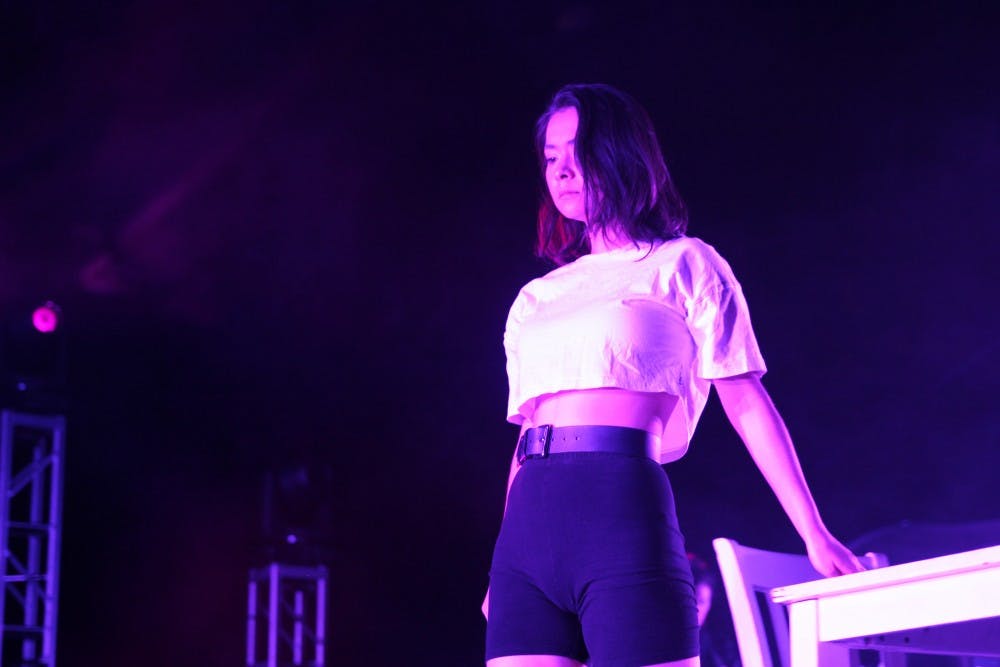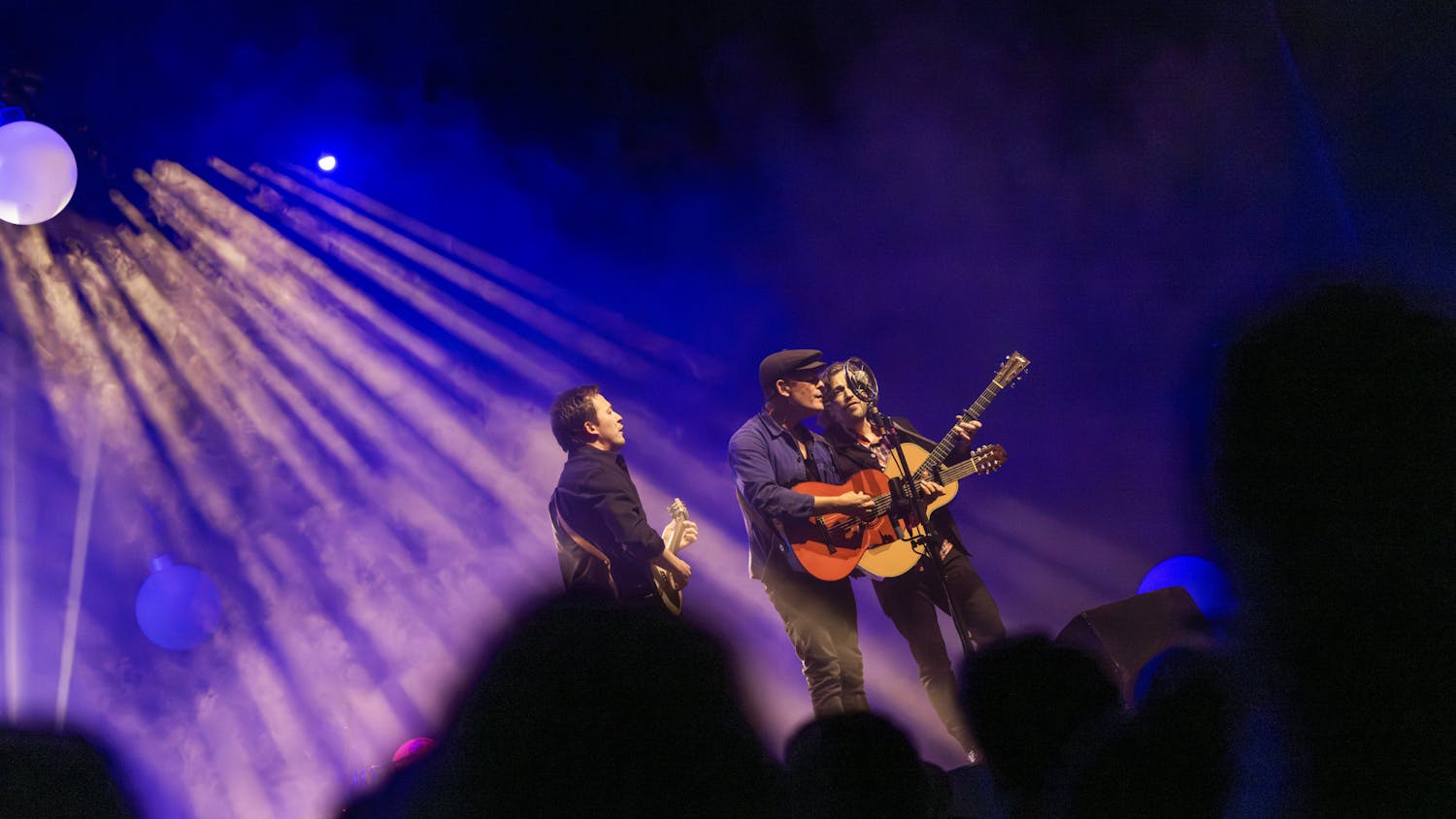The opening track on Be The Cowboy, Mitski's critically acclaimed 2018 album, begins with a single tone. It's piercing in its volume, but then pares down into a drone behind her voice, like a flame that focuses into an intense blue heat. Her music gives off that same sense of restraint, a straining against the bounds of the ordinary and quotidian, burning brightly and singularly.
This past June, Mitski announced she would be taking an indefinite break from performing, after approximately five years of touring. The final two shows took place this past Saturday and Sunday at the Summerstage at Central Park. Her final performance before her break showed Mitski at her peak, unbridled and at her full artistic potential.

Opening was Lucy Dacus, one–third of the indie supergroup boygenius, whose 2018 solo album Historian blew critics away with its honesty and the magnitude of Dacus' voice. She played songs from Historian, her 2016 album No Burden, and selections from her recent single–release project, including a cover of Edith Piaf's "La Vie en Rose." Performing both solo and backed by a band (including Philly's own Dominic Angelella), Dacus' voice rang out clearly, coupled perfectly with the twilight sky. While she played "Historians," the title track off her album by the same name, not a single sound could be heard among the crowd, save for the click of a camera phone pointed not at Dacus, but at the sky above.
The highlight of her set came with her performance of "Night Shift," the song NPR critic Bob Boilen picked as his top track of 2018. Though it began gently, with Dacus playing solo, her band entered halfway though, and the noise crescendoed into a total release of pressure. The song documents the end of a difficult relationship, Dacus screaming, "You've got a nine–to–five, so I'll take the night shift/And I'll never see you again, if I can help it." She closed out her all–too–brief set with a new track, detailing an awkward dinner with the father of a significant other—a narrative departure from her more poetic and emotion–based lyrics.

When Mitski arrived on stage she played it cool, while the crowd did the opposite. Entering in the darkness, she began "Goodbye My Danish Sweetheart" while smoothly crossing the stage to approach a plain white table set in the center, her band encompassing her on the edges. Though flooded by bright lights and a wash of heavily distorted synths and electric guitar, she remained this stoic in the face of the ecstatic audience, who hollered at every move she made—from taking a sip of water to executing her elaborate on–stage aerobics. The artist remained impassive, steadfastly performing heavily choreographed motions that complimented the emotional complexity of her music.

In a plain white shirt and black spandex shorts with matching knee pads, she dressed as if on her way to a workout. This isn't far from the truth — her act included every kind of physical exertion, from common leg stretches to climbing on top of the table and frenetically wagging her hands, as though obsessed with their symmetry.
The arc of her concert felt carefully in tune with the choreography, as well. She began the concert steady, weighing each motion she made, often frantically redo–ing them—circling the table and stepping on top only to jump down again. She couples this literal second–guessing with songs of doubt and shame, often in the face of an unattainable desire.
On "Washing Machine Heart," she sings, "Baby, though I've closed my eyes / I know who you pretend I am," moving sensuously while remaining reserved, almost robotically portraying intimacy. But by the time she reaches "I Don't Smoke," off her 2014 album Bury Me at Makeout Creek, she poses proudly on the table, declaring "I am stronger than you give me credit for," even strong enough to withstand the pains her lover brings.

It's no surprise that Mitski appeals so acutely to Millennial and Gen–Z listeners; her music revolves primarily around obsession, desire, intimacy, and a fascination (but ultimately a dissatisfaction) with the ordinary. This includes everything from ordinary work to ordinary love, although the two are intertwined throughout her discography. One can see this through album titles like Bury Me at Makeout Creek and Retired from Sad, New Career in Business. The curation of her setlist only highlighted these themes and how she has developed them into a stage show.
Perhaps the most violently anti–establishment line comes from her song, "Drunk Walk Home," wherein she declares: "I'm starting to learn I may never be free/ But though I may never be free/ Fuck you and your money/ I'm tired of your money."
It was, by far, the loudest this writer has ever heard something yelled back at a concert. Although denouncing the need for income, she reminds the listener in that same song, "you know I wore this dress for you, these killer heels for you," conceding that she is a slave to some things, still.

Combine this with the small gestures she asks from objects of her desire, such as in "Nobody," the disco–esque single from Be The Cowboy, when she sings "I know no one will save me/ I just need someone to kiss/ Give me one good honest kiss/ And I'll be alright." Sold–out crowds sing this song back to her, but it still feels just as full of longing. Onstage, she uses her movement to emphasize the masochism that these words can only state. Love is just love, but it takes pain to actually feel anything.
Watching her on stage, performing overly strenuous motions, one can also see how prominently a role this desire for pain plays into her work. Many of the relationships she describes are those that take more than they give. On "I Bet on Losing Dogs," she sings, "I always want you when I'm finally fine/ How you'd be over me looking in my eyes when I cum/ Someone to watch me die," linking her orgasm with death, and deriving pleasure out of tying herself to a lost cause.

What's most striking about her performance is how lonely it still manages to feel. All while every word is echoed throughout the crowd, Mitski herself gives little acknowledgment to her fans' adoration. While singing, she rarely looks out at the crowd, often instead gazing down, at herself, or at a point far in the distance. Between songs, the stage goes black.
The closest thing to banter during the set was near the beginning when she introduced her band. To close out her main set, she performed "My Body's Made of Crushed Little Stars" on a heavily distorted acoustic guitar (the only time she held an instrument for the night) and when she finished, she simply waved goodbye and walked off stage.
She began her encore with the solemn closer to Be The Cowboy, "Two Slow Dancers," an operatic swan song to a relationship neither partner wants to end. "To think that we could stay the same/ But we're two slow dancers, last ones out" she sings, bemoaning the pain of goodbyes, and the greater pain that comes with prolonging it.

Before performing her final song, she made sure to thank her band, her crew, and the audience. "This is all I ever wanted," she said peacefully, before beginning with "Carry Me Out" off of Makeout Creek. Accompanied solely on piano, she sings while holding her hand out into the night sky. By the time the rest of the band arrives to launch fully into the power ballad it is, she has turned to the crowd, as if seeing them for the first time, and reaches out while crying "And I/ say your name/ in hopes you'll hear it in the stars." When she finishes, she bows, says something so quiet it can't be heard, and disappears into the stage.







